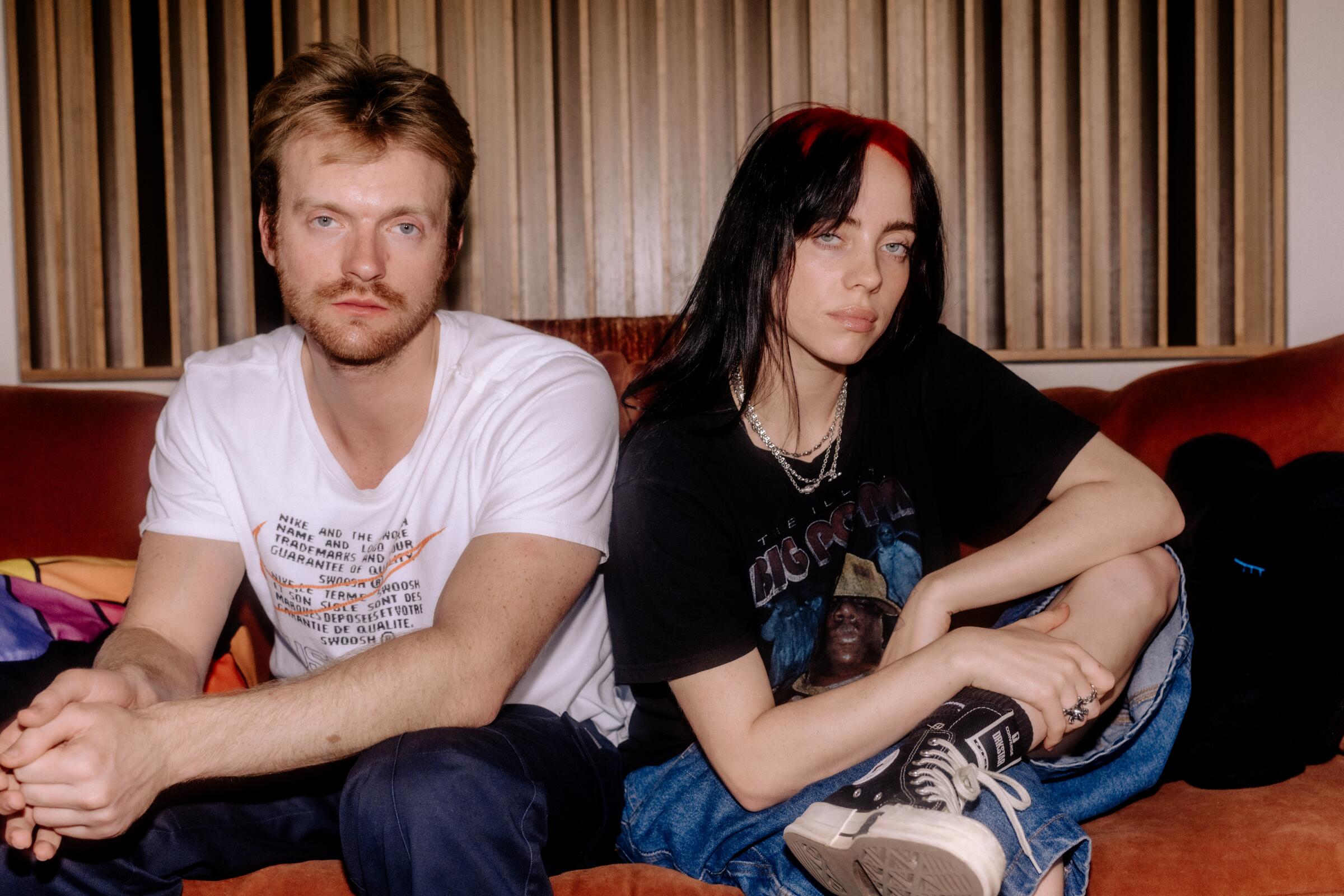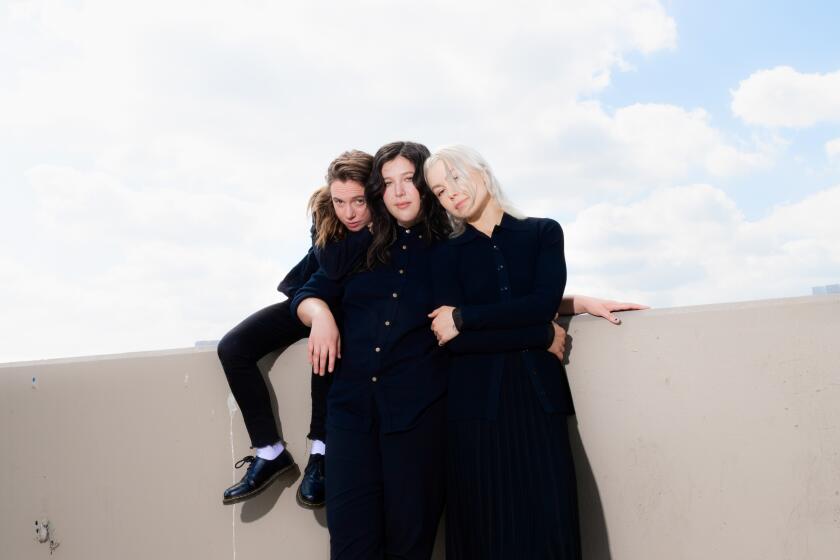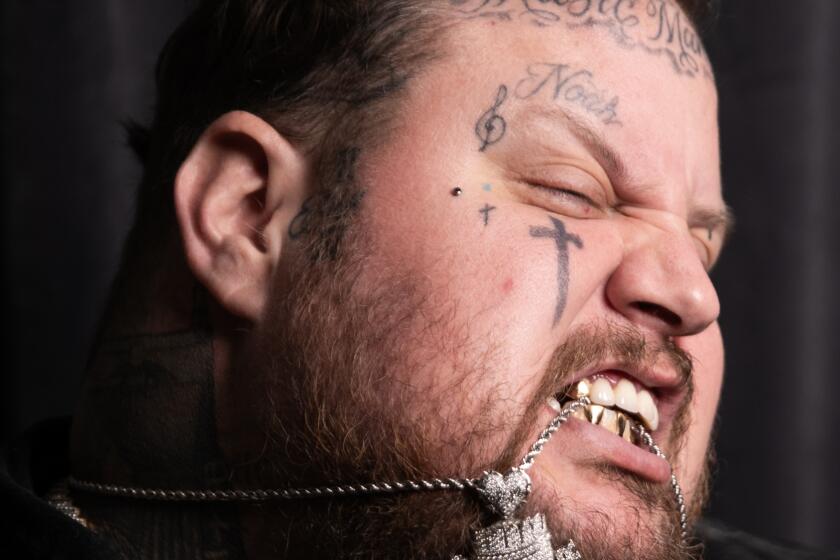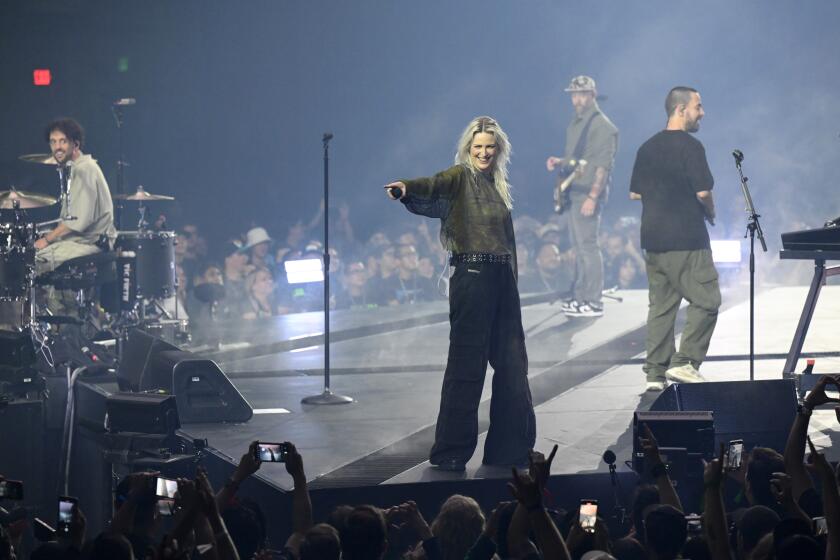August Brown covers pop music, the music industry and nightlife policy at the Los Angeles Times.
- Share via
1
Billie Eilish has seen your “What Was I Made For?” TikToks, and yes, they wrecked her too.
“When the song started to have a life of its own there, I spent one night staying up late looking at all the videos,” Eilish said, about the reactions to her emotionally ransacked ballad from this summer’s blockbuster “Barbie.”
Thousands of women posted their own childhood and present-day videos to match the film’s montage, reflecting on how adult life and disappointments have changed them. “It ruined my night,” Eilish said, affectionately. “It made me glow that I’m being a voice for women in a way. But I also thought about how it’s just devastating to be a woman.”
Not all the memes were such rough going, but they affirm that “What Was I Made For?,” written with her brother and producer Finneas O’Connell, has transcended the smash-hit film it arrived with. It snuck up to become the anti-Song of the Summer: an existential sigh about women’s melancholy and disillusionment, from a movie built on corporate IP.
On the eve of a new EP, the members of Boygenius reflect on their breakthrough year, closing their tour at the Hollywood Bowl and their Grammy heroines.
In late September, Eilish, 21, and Finneas, 26, convened in Finneas’ basement home recording studio in L.A. to talk about the song, widely seen as a contender for both Grammy and Oscar honors. Eilish’s black hair, formerly dyed radioactive green and platinum blonde for different albums, was giallo-movie red in the center part. The handwritten cue cards from her 2021 “Saturday Night Live” appearance were propped up near Finneas’ full-wall rack of synthesizers.
The twin SAG-AFTRA and Writers Guild of America strikes shut down the film industry for months, and since both musicians are members of SAG, they were forbidden to discuss the “Barbie” movie. But they did receive permission from the actors’ union to talk about the song and its path forward at the Grammys, where it’s been submitted for song of the year, record of the year and other top awards.

Famously, Eilish made Grammy history in 2020 as the youngest person to sweep all four major categories in a single year, for her goth-electro masterwork “When We All Fall Asleep, Where Do We Go?” She followed it up the following year with two wins, including for record of the year. Finneas shared in most of those Grammys, with his own 2020 win for producer of the year, nonclassical.
“What Was I Made For?” arrived toward the end of the filmmaking process in January. The duo had seen rough cuts from “Barbie,” director Greta Gerwig’s campy feminist romp that has become the year’s highest-grossing film. Beyond the wink-nudge bombast of “I’m Just Ken,” the film’s soundtrack is full of exuberant pop from Dua Lipa, Lizzo, Nicki Minaj and Ice Spice. Eilish’s song tugs the movie into a whole other emotional realm.
The siblings had installed a surveillance camera to capture every moment of the songwriting process for Eilish’s upcoming third album, so somewhere on their hard drive is the exact late-day moment when they came up with the song’s ruminative piano line.
They see “What Was I Made For?” on a character-study continuum from early singles like “Bellyache” (written from the perspective of a murderous teen) to their regal theme for the last James Bond movie, “No Time to Die.” Finneas relished the challenge of writing for a girlhood he never experienced.
“There’s this desire in a lot of music not to be too openly feminine,” Finneas said. “But I think it allows people to relate to your song if they’re allowing themselves to be vulnerable.”
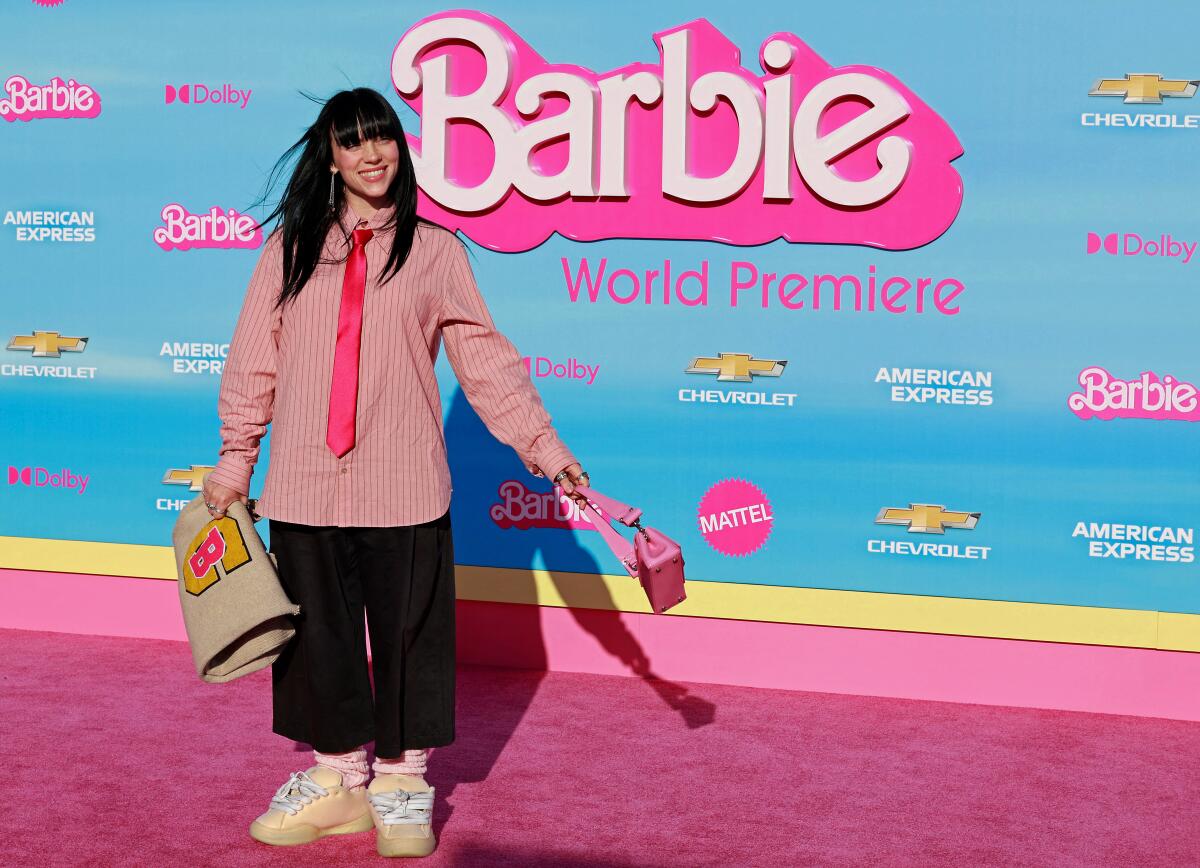
Billie Eilish arrives for the world premiere of “Barbie” at L.A.’s Shrine Auditorium.
(Michael Tran/AFP via Getty Images)
“What Was I Made For?” takes the “Barbie” conceit about an idealized woman feeling out of place in the real world to a bleak, lonely conclusion: “Takin’ a drive, I was an ideal / Looked so alive, turns out I’m not real / Just something you paid for / What was I made for?”
The echoes with Eilish’s contemporary pop stardom are obvious.
“The whole song was an excuse to say the truth,” Eilish said. “When I did meet-and-greets back in the day, [fans] would be talking to me and I literally would think, ‘Oh my God, if you actually knew me, you would not like me.’ It’s very interesting to be an ideal in somebody’s mind, and they actually have no idea who you are.”
When the song arrived in the film, even the most stoic dad on chaperone duty may have gotten teary about the passing of time.
“It’s the sort of anti-single in that it’s a piano ballad,” Finneas said, “but everybody has this moment of recognition.”
Jelly Roll is not your typical country star: His past includes prison, addiction and 20-plus records as a rapper. Now, he’s a favorite for multiple Grammy noms.
The song’s success arrives at a liminal time for Eilish, who is more than two years removed from her second LP, “Happier Than Ever,” and just a few months off a high-profile breakup with the Neighbourhood’s singer Jesse Rutherford. Eilish cautions against reading any song as autobiographical, but this song — about being widely seen yet deeply lost and misunderstood — has consonance.
“The Internet f— knows everything, and for anyone in the public eye, any relationship or friendship or falling out is really hard to keep private,” Eilish said. “It’s kind of unfair, when I just want to, like, exist. I want things to just belong to me. But unfortunately, that kind of comes with it. “

(Elizabeth Weinberg / For The Times)
Eilish and Finneas are neck-deep in writing and recording her third LP. They weren’t ready to talk specifics quite yet, but, Finneas said, “We’re making an album that if we had some horrible contract where it would never be released, and it was only going to be enjoyed by us, we’d still be making this album. Not that it’s self-indulgent, but just exactly the itch that we’re trying to scratch.”
While the two headlined European festivals over the summer, they look upon L.A.’s Summer of SoFi Stadium Blowouts with a mix of envy and trepidation.
“I find it really hard to play stadiums,” Eilish said. “Beyoncé and Taylor [Swift] are untouchable superstars; the fact that they can put on a show that long, and it’s filled with so many incredible moments, is really amazing. I don’t want anyone to think I’m ungrateful about playing stadiums, but when you go to one, there’s nothing in you that thinks that the artist knows you’re there. I want the crowd to know that I am seeing them with my own eyes.”
Now that “What Was I Made For?” is the miserabilist hit from the year’s biggest movie, girlies of all genders will have plenty to unpack whenever Eilish hits the road again.
“After this song, the longer I listen to women talk about their lives, the more I’m like, ‘Wow, it just gets worse,’” Eilish laughed, sardonically. “But there’s something really special and precious about women. Just being one and being with them, there’s such a safety in it, you know? It’s all so, so complicated.”
